The late Steve Lacy, a soprano saxophone player of no small repute, once stated that “the potential for the saxophone is unlimited”. I have no idea whether, when Lacy died in 2004, he was aware of a young musician from Michigan starting to make waves as a session musician for the likes of Tom Waits, as well as in his own groups, but if he was, he may have recognised someone with the ability to take that instrument further than anyone has ever previously managed.
Or, perhaps, further than any instrument has been taken. A few weeks ago Colin Stetson played two nights at Dalston’s Cafe Oto. Having become wholly consumed by Stetson’s New History Warfare Vol. III: To See More Light album (for Stetson’s music is not something you consume, but something that swallows you up like a ravenous brass beast), and gone backwards from there through the rest of the trilogy, I was eager to see him perform, if only to try and get a better idea of how the hell he actually makes his music.
See, Stetson’s technique is as extraordinary as it is original. With mics placed not only in his (ludicrously huge) instrument’s bell – no laughing at the back – but on the neck, near the keys, in various positions around the studio/venue and even on his own throat, he produces music so huge and complex it’s impossible to believe it comes from one man. His astonishing circular breathing ability allows him to produce spectacular polyphony, enhanced by him simultaneously ‘singing’ through his throat, while the rhythmic clicking of his fingers on the keys and the ambience of the room itself all play their part too.
I left Cafe Oto dazed. On the one hand I was now satisfied that it was genuinely him alone conjuring all that sound. Yet I still couldn’t quite accept what my mind and ears had just witnessed. It was almost too much. The New York Times called him a “one-man astonishment engine”, which is a pretty fitting description in the sense that the power and stamina he possesses seems almost inhuman.
Yet it also makes him sound like some sort of musical weight-lifter, whereas what makes him special is that two decades of devout dedication to his art has been honed into something not just physically impressive, but deeply moving. His music has a visceral emotional resonance, to the point that hearing To See More Light for the first time was like being punched in the soul. I’ve struggled to summon more than a handful of records that have had such a potent emotional impact, and am yet to think of one musician I’ve witnessed who’s impressed me more in the flesh. Although watching him is also to watch all the hours you could’ve spent practicing music flash past your eyes and into a nearby dustbin marked ‘possibility’. The bastard.
Naturally, then, the chance of chatting to him before the show was not something to be passed up, although there was a worry that this might not be the best time to do so; not only was he clearly knackered from touring, but this was only a couple of days after Lou Reed’s death, who Stetson had met and played with through his collaborations with Laurie Anderson. I felt bad when I brought it up towards the end of our interview, but Stetson’s memories of Reed, though obviously tinged with grief, were warm. “They’re very good. He had an amazing life, and the time that I spent with him was really interesting musically, it was really exciting intellectually, and it was also really loving. He’s a very sweet and warm person to be with”.
There is, unsurprisingly, a real sadness in his eyes when he says this, but then it seems to be there all the time, even when he laughs. Perhaps it’s just projection on my part, owing to the emotive content of his music, but it fits with his careful, thoughtful tone, eager to not misrepresent the music he’s worked so hard to create. So what better way to cheer him up than to start the interview by, um, talking about feelings…
I don’t think I’m alone in having experienced a very emotional reaction to New History Warfare III: To See More Light. The anguish of ‘Hunted’, the loneliness of ‘High Above A Grey Green Sea’, the fury of ‘Brute’. Do you have to summon those emotions inside yourself in order to perform them live?
I mean, on its face, physically, it takes all of that to get those pieces out. There’s something in their design that is, in a very baseline, mechanical way, suited to the emotional intent that I’m trying to apply. So something like ‘Hunted’, the act of performing it is pretty visceral, while ‘Brute’ feels both super-painful and extremely chaotic, but also thrilling. I wrote ‘High Above…’ to conjure a character that is literally without other, the idea of something that has never known another like it, but still, somewhere inside, is searching for that very thing. So I’m happy whenever anybody listens to the music and is able to absorb that intent, because that’s what I was trying to do [laughs].
There’s also a real immediacy to the music, which made it slightly surprising to discover that it’s stringently composed with no improvisation, despite being recorded live without overdubs. Were there any tracks that did end up somewhere you weren’t expecting?
I mean, there are moments here and there where things happen. There’s a moment in ‘To See More Light’ when a massive amount of spit and gunk came up through my mouth and flew into the mouthpiece, and you can actually hear it – there’s this moment between melodies where all of a sudden the sound turns to SQUIRSHHHK, and it’s almost as if there’s some static on the line. There are certainly things that happen, because it’s a lot of chaos for me to control and there are so many variables, and I’m certainly not trying to keep it pristine or whatever, or totally controlled. But for the most part, the third record is my most fully realised of the three. I’d say that there were a lot of surprising moments and improvised moments on Volume I, and several on Volume II. There aren’t many on Volume III at all.
I thought perhaps the fact that you play everything yourself makes it easier to communicate your message, as it’s not diluted by having to be explained and translated by other musicians. Although you have collaborated with vocalists like Laurie Anderson and Justin ‘Bon Iver’ Vernon. What do you tell them when you work with them? Particularly Vernon, whose contribution on ‘Brute’ is so different to the output he’s famous for…
Yeah, Justin and I had been talking a lot on tour about working on this stuff – I wrote two of the four songs that he sang on while on tour with Bon Iver. So I would always finish things and then play them for him, and start the process and just let him know where I was at. And there was a long process between the two of us where I would not only share with him the music, and share with him the demos of the music, but also write out the more abstract narratives and the imagery that I was assigning to these particular songs – what, thematically, I was trying to conjure up. Also, specifically, melodically and timbre-ly, where I felt the voice was lying within the construct of the song, as it was. So it was really specific throughout the back and forths, but not so much to the point where I was writing his parts for him. You don’t have somebody like him, who’s so singularly talented, and write them parts. It seemed a waste. Just as on Volume II, asking Laurie Anderson to read, and then writing her words for her?
You’re not really taking full advantage of the talent on offer…
Yeah, what’s the point? You’re not collaborating unless you’re collaborating with the person and their art. So yeah, there was direction and there was a foundation, and I need things to be within the construct of the song, but beyond that Justin brought to it his own reactions.
I suppose he also had more insight into the New History Warfare narrative than most too, considering that there aren’t many lyrics across the trilogy. Do you think most listeners got the story behind the music? And does it matter to you whether they did or not?
You mean did most people perceive my intention? The story was never important, that people listen to it and hear this abstract narrative – to me that’s just a corollary, that was something that was for me so that I could… it was almost like a parallel skeletal structure that I could build up at the same time as I was building up the music, so as to play off of one another. So I could create something that I felt had the right shape, and the right content. So, of course, I don’t ever need anybody to know what was going on in my head in terms of all of that imagery, but what I’ve been really happy with is that it seems as though most people, at least the ones who come back and talk to me about it, largely understand my intention in terms of the bigger aspects of it – the thematics, the emotionality of it, and the larger intent throughout all the songs. So that’s intact, I feel that’s understood.
Would you ever be tempted to try and tell the story in a more traditional format?
I’m working on it right now. It’s been really hard to write a book when you’re on tour…
Or anywhere…
Yeah, totally [laughs].
But that is something that’s going to happen?
Yeah, I certainly hope so. I’ve talked about it enough so I’ll have to… [laughs]
While the narrative is fictional, do you have to summon equivalent personal experiences in order to get into the right state to perform it…
[Hesitantly] Sure. For me it’s not like an actor who’s walking into a scene and has to cry, and so they need to think about this one thing that happened to them when they were a kid in order to make that moment happen. It’s not anything like that. All the premises of all the songs I think are really basic human experience, consciousness things. They’re universal. So I’m kind of storytelling not based [directly] off of my life but certainly based off my life and experience, and also my vicarious experience through other stories, other people’s lives, to the extent that you can carry all of that and channel it. It’s nothing so literal as trying to get into a head-space to make a certain thing happen. But again it goes back to the mechanics of the songs. The foundation of them all is a physical relationship between me and the instrument and me needing to work in a certain way to make the music happen. So that process almost becomes the intent, because in order to make it you must be put into a certain state.
At this point the recording is very slightly compromised by the double bass farting of the support duo’s soundcheck. To give you an idea of what it sounded like, after they finished their set my Dad turned to me and said, “those instruments must be thinking, “what have we done to deserve this?””.
Talking about vicarious experiences, what other art has inspired you?
I always say this, but what’s really huge for me is Terrence Malick’s films. I was re-watching The Thin Red Line for, like, the 50th time the other day, and you have those moments when you sit down and see something, and you put it into your present context and you realise just how much all of these things very much leak through into you, and what it is that you create. So I think that there’s huge fingerprints of that all over it. Huraki Murakami, most of his novels. Hard-Boiled Wonderland and the End of the World. Musically, most recently, Liturgy’s Aesthetica was just enormous. I think if there was any huge influence on Volume II it was probably exposure to an enormous amount of pre-war American gospel music, and on Volume III if there was anything that was different, it was the inclusion of a lot more black metal, specifically Liturgy.
You can definitely hear the black metal influence, although due to the instrument you play you’re more often tagged as an experimental jazz musician. Do you see yourself as part of any musical lineage?
No, but everybody else does so I just leave them to it. It’s funny. I tend to not read anything about anything that I do, or really anything that anybody does, or any music journalism [laughs]. But whenever people have told me things that people have said… it’s funny to me a lot of the time. Somebody will get really up in arms, “this isn’t exactly like the minimalist music that I grew up on and love”, but clearly writing about it as if I was somehow ‘canon’, like I’m in this tradition of minimalist composers. I didn’t know that I signed up for that. But it happens for everything, it just depends on people’s perspectives. If people are real mainstream they think what I do is super crazy, and if they’re way out they think that I’m pop [laughs]. I don’t care, I just do what I like to do and hopefully people get something out of it.
Let’s talk about your instrument, specifically the baritone saxophone. It’s over a hundred years old, right?
Yeah, what is it, a hundred and five?
How did you find it?
I found it on eBay in 2005. It was a guy in Illionois was getting rid of it. He’d played it in the past but I guess it hadn’t seen too many gigs for a few decades [laughs]. So I was able to get it, and since then haven’t spent much more than a day or two without it. It’s been all over the world.
Were you worried about spending money on it without having the opportunity to play it first? Or did you have that opportunity?
No, no, I bought it sight unseen. I’d seen it on the computer and I had several really intensely talented repair men who scoped it for me and asked questions, and figured that from what they could see there weren’t any problems. In the end it was a steal, considering all the time I’ve been able to spend with it. It’s a phenomenal instrument.
How much does playing it take out of you physically?
Quite a lot. Today I’d definitely say it’s pretty taxing.
Do you have any specific fitness regime to help with that. I mean, presumably you don’t smoke…
[Laughs] No, I haven’t smoked in many years. I run. I’ve had to change what I do on solo tour because I found that I was doing too much, it would just make me utterly exhausted. So I tend to run on tour three or four times a week tops. But I do yoga every day, and some little exercises here and there, some daily things for my hands and my shoulders, just real maintenance stuff. There is an enormous amount of stuff that goes into it, but then there are days like today where I was just fucking wrecked. So I napped for most of it trying to get back to normal.
This is quite morbid, but I remember reading a statistic many years ago, which probably stuck in my head because of my Dad playing sax, but apparently saxophonists die younger than any other musicians.
Yeah, I wonder what it was that they were dying of? But it is a thing. There was a lot of them who died of brain aneurysm specifically, and heart-related things. So there has to be something to that. But yeah, I think if you’re basing it on the majority of jazz sax players throughout the twentieth century, you’re talking about a lot of dudes who had really hard lives, lived and worked really hard, and smoked a lot. Everybody smoked. So yeah, I don’t know if it’s a controlled experiment [laughs]. Don’t tell my mom about that…
I’ve played your music to several people who probably would never have otherwise come across it, and it’s often seemed to resonate quite strongly with them, even if the description put them off. Is that something you’re proud of, to be able to communicate beyond your expected audience?
I wouldn’t call it a point of pride, but that has been the case. I mean, you don’t make a solo sax record and sell as many copies as I do just to people who buy solo sax records, obviously. Or in terms of the response on tour and the amount of people who come to see the shows, that’s been better than I ever could have hoped. And I’ve been doing this for a really long time, so I’ve seen over the years how it’s picked up. This past decade the kinds of venues have changed considerably, and the recognition I’ve got has changed considerably, and I also think it’s because the music has got much more fully realised and, for want of a better word, ‘better’.
But yeah, that [crossover] is certainly there and I’m really happy about it. I wouldn’t say prideful, but definitely happy. Whenever people are looking past their own preconceptions about what they would listen to – because it’s all packed up in our sense of identity – whenever anybody breaks from that it’s a good thing. And I’m certainly not alone in that. I’m part of a growing trend in the past five to ten years where people are more and more willing and desirous of going outside of what was once a comfort zone, into a kind of place where they don’t necessarily have that any more. Their consumption of music and art is much more varied, and no longer worn like a badge.
You’ve now come to the end of the New History Warfare trilogy, which has spanned six years. Now it’s done, is there a sense of relief that it’s over, or excitement to start something new?
There’s no relief. I’m happy that I was able to make it, I’m happy I was able to see this through, and I’m happy with the way that it all came out. But there hasn’t been any book-ending in terms of my output, I’m already well into several new things, continuing to write. I can’t say when anything new will be out, but it won’t be very long.
What’s the next thing we might expect to hear?
I can’t really talk about it yet, it’s not finished enough in my brain and heart to talk about it yet. But it will be soon [laughs].
Not soon enough. Listening to all three parts of the trilogy in a row, Stetson’s assertion that his music is becoming evermore realised is undeniable. If his extraordinary technique keeps on developing, a mind-bending prospect in itself, the potential for his music is, to refer back to Steve Lacy, infinite.
There’s something else Lacy said: “You have to sound sad first of all, then maybe later you can sound good”. Colin Stetson can sound both. And then some.
Words: Kier Wiater Carnihan
Photo: Keith Klenowski
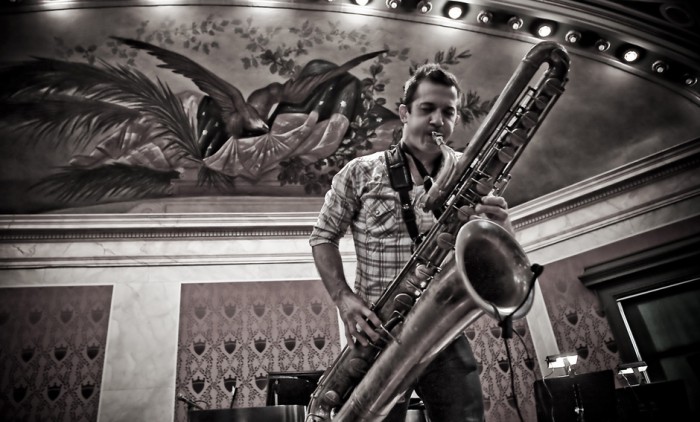
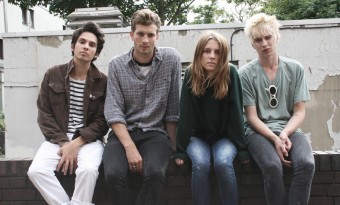

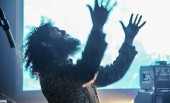
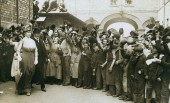
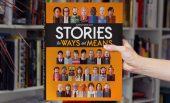
Follow us
Follow us on Facebook Follow us on Twitter Follow us on Google+ Subscribe our newsletter Add us to your feeds